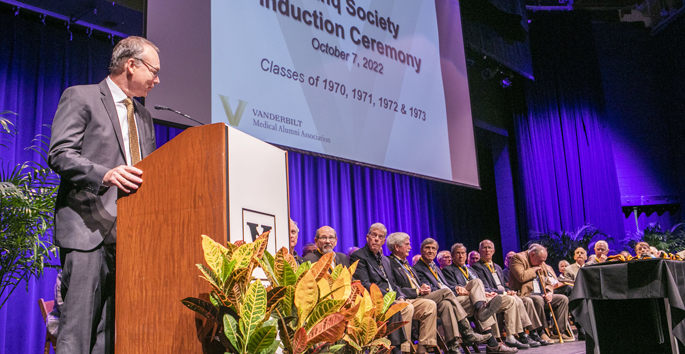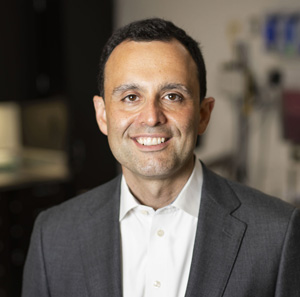
by Bill Snyder
As head of Metro Nashville’s COVID-19 Task Force during the height of the pandemic, Vanderbilt orthopaedic trauma surgeon Alex Jahangir, MD, MMHC, witnessed a wide swing of human emotions.

Mask mandates, designed to curb the spread of the virus, were met with resistance and outright hostility. Yet many Nashvillians quietly went out of their way to protect their more vulnerable neighbors.
“For me, the pandemic laid bare the reality that we’re all in the same boat,” Jahangir told attendees of Vanderbilt University School of Medicine Reunion Weekend on Oct. 7. “Each of us has the capacity to right the boat or capsize it.”
The three-day event included anniversary parties for medical school classes, talks by distinguished alumni, and an update on Vanderbilt University Medical Center given by Jeff Balser, MD, PhD, VUMC’s President and CEO and Dean of the School of Medicine (class of 1990).
Jahangir, who earned a Master of Management in Health Care from Vanderbilt’s Owen Graduate School of Management in 2012, is director of the Division of Orthopaedic Trauma and medical director of the Vanderbilt Center for Trauma, Burn and Emergency Surgery.
He was serving as chair of the Metro Board of Health when the pandemic hit. Mayor John Cooper asked him to lead the city’s response to COVID-19 with a reliance on science and a commitment to transparency. “I did my best,” Jahangir said. “But I never did my best alone.”
In a new book titled “Hot Spot: A Doctor’s Diary from the Pandemic,” Jahangir credits city officials, and leaders of Nashville’s health care community, including Meharry Medical College president James Hildreth, PhD, MD, with helping to implement critical public health measures despite at-times withering criticism and opposition.
Meharry, a historically black medical college, ran the city’s testing sites for more than two years. Middle Tennessee’s three large hospital systems — VUMC, Ascension’s St. Thomas Health and HCA’s TriStar Health — organized regional transfer centers to find hospital beds for the sickest patients.
By the end of 2021, thousands of vaccine doses had been administered, and fewer Nashvillians had died of COVID-19 than early models had projected.
To Jahangir, that is the lesson of leadership. “It is adversity that defines true leaders,” he said, “whether we are city leaders, leaders of corporations or nations, or simply leaders of our own lives, responsible for our actions.”
COVID-19 will not be the last disaster. When the next one strikes, “we must go forth together,” Jahangir said. “We must hold our families close. We must care for others more than we care for ourselves.”